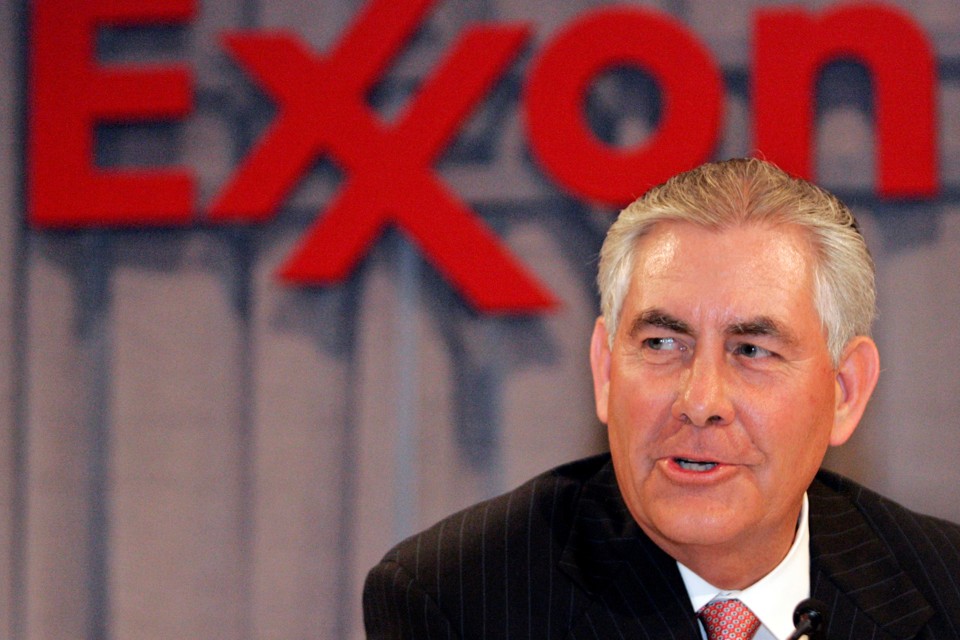
For a moment, it looked like Donald Trump might have lost heart. On Saturday, well-sourced reporters were indicating that the president-elect’s appointment of Rex Tillerson as secretary of state was imminent. But then things went quiet. Trump tweeted noncommittal praise but made no announcement. Meanwhile, some leading Republicans began voicing concerns about the Exxon CEO’s relationship with Russian President Vladimir Putin. Had the Saturday reports been a trial balloon that was shot down?
Like many of Trump’s most interesting stances and allies, the Tillerson nomination cuts across typical coalitions and ideological lines. Many Democrats will instinctively oppose him, in part because he’s a Trump pick and the head of Exxon, a liberal bogeyman. But others may back him, calculating that a successful business executive is not a soft political target. But the Senate has a rhythm of its own and can move unpredictably. Depending on how tightly Democrats whip their votes, a few Republicans defecting could sink a Tillerson nomination. And that’s where things get interesting.
Being a "friend of Vladimir" is not an attribute I am hoping for from a #SecretaryOfState - MR
On Tuesday, Rubio followed up with a statement:
While Rex Tillerson is a respected businessman, I have serious concerns about his nomination. The next secretary of state must be someone who views the world with moral clarity, is free of potential conflicts of interest, has a clear sense of America's interests, and will be a forceful advocate for America's foreign policy goals to the president, within the administration, and on the world stage. I look forward to learning more about his record and his views.
Senator John McCain, who has been outspoken in his concerns about Russian electoral interference, also expressed reservations on Sunday. “I don’t know what Mr. Tillerson’s relationship with Vladimir Putin was, but I’ll tell you it is a matter of concern to me,” he said on Fox News. “You want to give the president of the United States the benefit of the doubt because the people have spoken. But Vladimir Putin is a thug, a bully and a murderer, and anybody else who describes him as anything else is lying.”
Trump spokesman Jason Miller told CNN, without providing examples, that Tillerson had stood up to Putin.
Sitting somewhat to the side of the debate, as often, is Senator Rand Paul. It’s been reported, though not confirmed, that Trump will buttress Tillerson’s lack of experience by appointing John Bolton, the superhawk and former ambassador to the United Nations, as deputy secretary of state. The Kentuckian says he’s an “automatic no” on Bolton.
On the other hand, plenty of Republicans are already on board. Majority Leader Mitch McConnell says he’ll support Tillerson’s nomination. And even Jeff Flake, an Arizona senator who was a noisy critic of Trump, seemed positive:
The fact that Condi Rice, James Baker and Bob Gates are recommending Tillerson carries considerable weight. I look forward to the hearings.
That support from respected former Republican Cabinet secretaries is indeed interesting and notable. All three were critical of Trump during the campaign, and all three hail from rather different foreign-policy lineages than Trump. It is impossible to tell how they might overlap or diverge from Tillerson, who has articulated only a limited sort of diplomatic worldview.
The critics of the Tillerson nomination all left the door open to backing Tillerson, essentially pleading with him to make so unequivocal a condemnation of Putin that he they can confidently support him. But what if they don’t? Or what if he won’t? What would have led Trump to take that chance, despite the warning shots over the weekend?
Perhaps Trump is willing to risk dying on this hill because his affinity for Russia is truly strong. There’s ample evidence to suggest that: His praise for Putin, his disdain for NATO, his steadfast refusal to even countenance the idea that Russia might have been behind hacks in the election. Selecting Tillerson reinforces his desire to reach an understanding with the Kremlin. Or perhaps Trump sees in Tillerson some sort of foreign-policy brilliance not yet revealed to the public.
But who knows? While there’s probably no single answer, a central factor may be that Trump just doesn’t think the Senate is a threat. Consider the track record. Republican leaders in the House and Senate criticized Trump for his policy ideas, called his statements racist, and otherwise distanced themselves from him for months. In the end, they split into two main camps. There were those, like Sasse and Flake, who never wavered, and while their stand was courageous, Trump can look back now and see it didn’t come near stopping him. Then there were those, like McConnell and Speaker Paul Ryan, who choked back their reservations and endorsed Trump. The president-elect has learned his lesson: There’s nothing Republicans in Congress can or will to slow him down, whether it’s his extensive conflicts of interest or his Cabinet nominations. Until they prove him wrong, why would he believe otherwise?


No comments:
Post a Comment